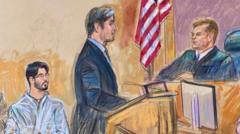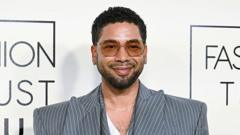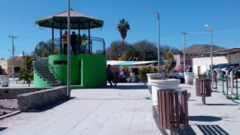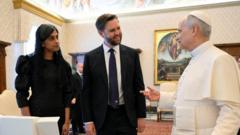During his first Mass, Pope Leo XIV underscores the need for the Church to engage with the struggles of everyday people, signaling a commitment to address contemporary challenges while continuing the legacy of his predecessor, Pope Francis.**
Pope Leo XIV's First Mass Marks a Call to Action for the Church and Its Followers**

Pope Leo XIV's First Mass Marks a Call to Action for the Church and Its Followers**
In his inaugural Mass, Pope Leo XIV pledges to uplift 'ordinary people', focusing on missionary outreach and addressing societal wounds.**
In a momentous ceremony held at the Sistine Chapel, Pope Leo XIV delivered his first Mass as the newly elected leader of the Roman Catholic Church, appealing directly to "ordinary people" and proposing a renewed focus on missionary outreach to address societal wounds. Following in the footsteps of his predecessor, Pope Francis, Leo XIV called upon the Church to navigate contemporary issues, emphasizing that a decline in faith has led to significant violations of human dignity across the globe.
The newly minted pontiff, hailing from Chicago and previously known as Cardinal Robert Francis Prevost, evoked a deep post-Columbian dialogue throughout his homily. He asserted that many in today's society dismiss Christian values, considering them as remnants of an outdated worldview. He noted that even Jesus faced abandonment from his followers at critical times, paralleling it to modern society's disillusionment with faith. Leo's message highlights the Church's vital role in not just protecting doctrine but actively engaging with the needs of its congregants.
The American-born Pope will soon confront pressing issues that challenge the global Church, from inclusivity within the faith to addressing the rising tide of secularism. His urgent call for "missionary outreach" addresses the idea that the Church must communicate and connect with people in environments hostile to faith.
The election of Leo XIV marks a pivotal moment for American Catholicism, reflecting a shift in the Church's power dynamics as it embraces a leader rooted within both the U.S. and the global community. His homily, aimed at cardinals who attended the ceremony, reaffirmed his commitment to inclusivity in Church discussions. He reaffirmed the importance of maintaining dialogues open to all believers, a notable continuation of Francis's legacy of democratizing church governance.
In the backdrop of a nation seeing shifts in its religious affiliations, the first American pope's journey may chart a path for revitalization and engagement within the Church. As he prepares to take on a leadership role in a fragmented societal landscape, many observers will be keen to see how Leo XIV translates his profound convictions into actionable change that resonates with 1.4 billion Catholics worldwide. The Pope’s first public address on Sunday will likely be a key moment for him to solidify his vision for the future of the Church.




















